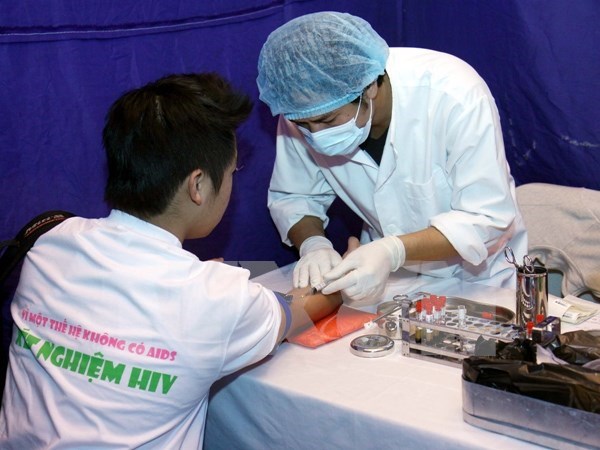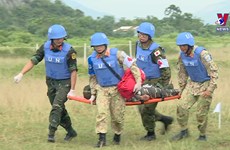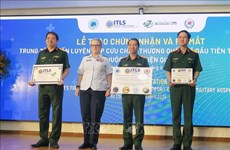HIV/AIDS treatment costs to spike
People with HIV and AIDS are expecting medical costs to soar when international health aid is cut off next year, participants at a policy dialogue said on June 27.
 A medical worker takes blood sample for HIV testing (Photo: VNA)
A medical worker takes blood sample for HIV testing (Photo: VNA)Hanoi (VNA) – People with HIV and AIDS are expecting medical costs to soar when international health aid is cut off next year, participants at a policy dialogue said on June 27.
Further complicating the issue, this demographic has found it difficult to secure health insurance.
The dialogue on a health insurance policy for people living with HIV/AIDS was co-organised by The Vietnam Union of Science and Technology Associations and the Health Ministry’s Department of HIV/AIDS Prevention and Control.
Health insurance is expected to be a life preserver for HIV/AIDS patients in Vietnam, particularly when international aid, which covers almost all medical fees for HIV-positive patients in the country, will cease next year because Vietnam has now been categorised as a middle-income country.
Deputy Head of the AIDS Department Hoang Dinh Canh said that when HIV/AIDS patients pay for health insurance, they would be held accountable to the medical treatment scheme.
As a result, they would avoid skipping treatment or shifting to other medical treatment schemes, which are usually more expensive, he said.
Trinh Thi Le Tram, Director of the Hanoi-based Centre for Law, Healthcare and HIV/AIDS Policies under the Vietnam Bar Association, said HIV/AIDS patients are usually poor, unemployed or have unstable incomes.
“They usually fail to afford health insurance cards, and they need significant medical care to treat opportunistic infections in addition to their anti-retroviral (ARV) treatment,” Tram said.
Despite the fact that under the Law on Health Insurance, poor households were granted free health insurance cards and near-poor households had to pay only half of health insurance fees, people with HIV/AIDS still struggled to gain health insurance coverage.
Do Dang Dong, a representative from the Vietnam Network of People Living with HIV/AIDS (VNP+), said that besides administrative difficulties in applying for health insurance, societal stigma and discrimination were major barriers that prevented HIV/AIDS carriers from seeking insurance.
Those who left their hometowns to live in other localities also find it difficult to obtain insurance because only residents with permanent or temporary registration can apply for health insurance, he said.
HIV/AIDS children born overseas to mothers who were trafficked or married foreigners could not apply for health insurance either because they did not have birth certificates, he added.
Dong said that many people with HIV/AIDS also suffer from cancers that require expensive medicines.
Under a circular issued by the Health Ministry guiding the revised Law on Health Insurance, 25 types of expensive medicines used to treat cancer were paid for by both health insurance agencies and patients, Dong said, adding that it was a big burden for HIV/AIDS patients.
An HIV/AIDS carrier in Hanoi’s Gia Lam District said he had to take a medicine that cost 1.35 million VND (60.70 USD) daily to prevent the development of cancer cells.
Previously, health insurance paid for the medicine in whole, but since 2015 he has paid half, which created a large financial burden for him and his family, he said.-VNA













